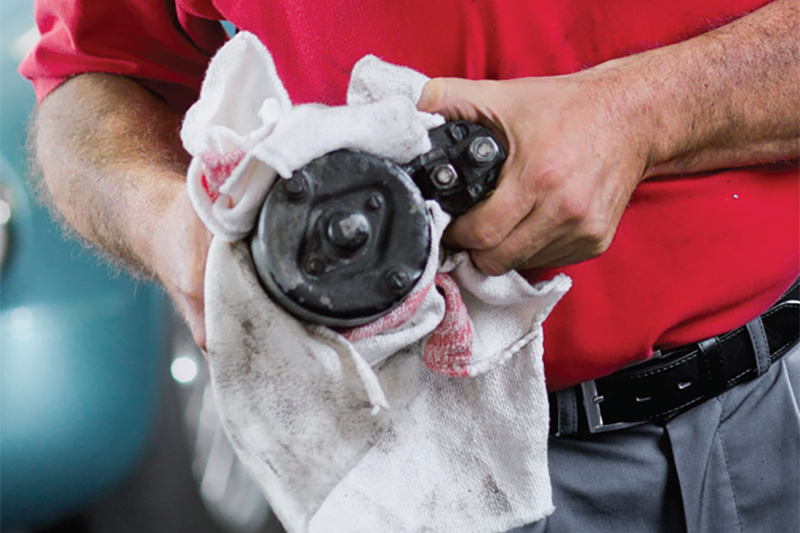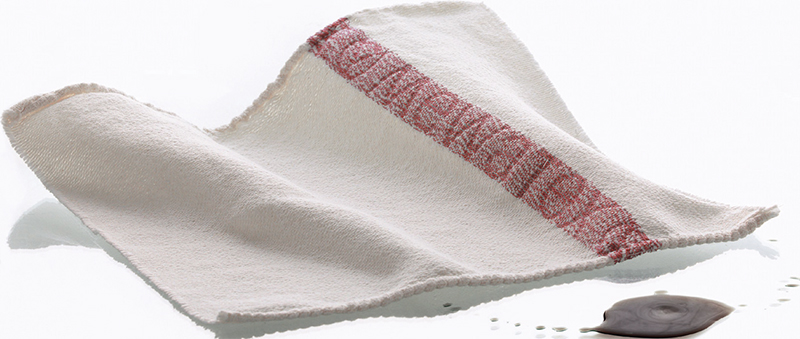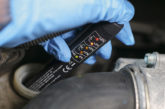
Mewa explores the environmental cost of single use rags, blue roll and paper wipes when cleaning up liquids such as oils and grease.
A study by the climate-neutral consulting firm, ClimatePartner, has shown the enormous ecological footprint of disposable cleaning cloths compared to reusable textile cloths. Mewa UK Managing Director, Günes Yenen, looks at the findings and tells us why reusable cleaning wipes are better for business and the environment.
It’s obvious that the more often something is used before it’s replaced, the smaller its environmental footprint, but what this study has worryingly revealed is just how large the ecological footprint is to make a disposable cloth that is thrown away after a single use.
The study looked at water and energy consumption, as well as CO2 emissions during the manufacturing of both types of wipes. The results showed significant differences, up to 40 times more, in the resources used to remove 1kg of dirt. It compared the Mewatex 100 per cent cotton cloth with a 100 per cent cellulose paper towel and a non-woven cloth made of 70% cellulose and 30% polypropylene.
Looking at water first, it was found that the total amount of water consumed when removing 1 kg of dirt with a disposable paper towel is 188,500 litres, compared to just 4,538 litres for the Mewatex wipe.
The energy consumption during production was also clearly contrasting; the reusable wipe consumes nearly three times less energy than a disposable wipe using 87 kWh compared to 31 kWh for a reusable cloth.
In terms of greenhouse gas emissions generated, disposable wipes cause between 2.8 and 5 times more pollution than reusable cloths: 33.3 and 61.6 kg of CO2 compared to 11.9 kg of CO2.

Also notable was the difference in the amount of textile needed to make the cloths. The amount of textile used in a disposable paper-based cloth is 25.5 kg compared to just 0.5 kg for a Mewa cloth that has a cleaning life of up to 50 applications.
In addition to the conservation of resources and emissions, there are other environmental benefits of using reusable wipes. Because of their reusability, the company estimates that the use of their wipes by customers prevents some 85,000 tonnes of industrial waste from being created.
Furthermore, any cleaning wipes, disposable or reusable soaked with oil and many other industrial fluids commonly found in garages and workshops, are classified as “absolute hazardous” entries on the Waste Framework Directive’s “list of waste” document. Therefore, they must be safely stored before being disposed of by an accredited hazardous wastes contractor. If they are disposed of incorrectly, they could end-up in landfill creating pollution.
A solution
As part of Mewa’s service, they collect and launder soiled wipes and return clean ones for use. This eliminates the need to manage the purchase, delivery, storage and disposal of single-use materials, not to mention all of the wasteful packaging these come in. The service also removes the significant burden of hazardous waste storage and disposal from companies, as well as mitigating potential health and safety fines.
The washing process is compliant with all legal and environmental regulations. But they go further; Mewa recovers the oils from used wipes to power their washing and drying systems, thus covering 80-90% of their energy requirements and they purify wastewater by up to 99.8% before releasing it to urban sewage treatment plants. The company also reduce consumption of washing and rinsing water by 50% through recycling.
Cleaning wipes are one of the most used consumables in the automotive industry. Millions are used and disposed every year. Companies need to rethink the impact of their choice of the humble cleaning wipe on the environment and embrace the sharing economy.
Garages and workshops choosing a green option will not only help the planet, but reputations can be enhanced, increasing appeal to evermore sustainability-focused customers.









